Alan Paul's Blog, page 17
December 10, 2016
Jimmie Vaughan: Powerful Stuff
 Jimmie Vaughan and Steve Miller were terrific last night, playing the music of T-Bone Walker at Jazz for Lincoln Center. Afterwards, I had a great chat with Jimmie whom I had not seen in person in over a decade. It inspired me to dig up this interview, originally published in Guitar World, July 2010. I think you’ll be able to see why I’ve always enjoyed speaking with him so much.
Jimmie Vaughan and Steve Miller were terrific last night, playing the music of T-Bone Walker at Jazz for Lincoln Center. Afterwards, I had a great chat with Jimmie whom I had not seen in person in over a decade. It inspired me to dig up this interview, originally published in Guitar World, July 2010. I think you’ll be able to see why I’ve always enjoyed speaking with him so much.
As he releases his first new album in nine years, Jimmie Vaughan celebrates the music he loves and remembers the brother he lost 20 years ago.
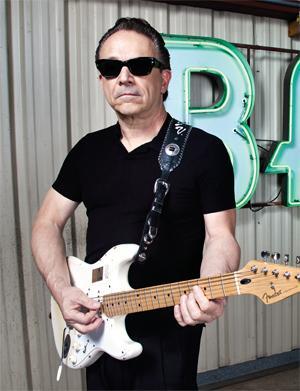
It’s been nine years since Jimmie Vaughan released his last album, 2001’s Do You Get the Blues? But when it came time to record his newPlays Blues, Ballads and Favorites, Vaughan, who produced the album himself, didn’t have to think long about the sound he wanted to create with it.
“I wanted the dirt and the fun to be there, because that’s what made me fall in love with music when I was a teenager,” Vaughan says. “The audiophile freaks may hate this, because it sounds like a jukebox—it’s all raw, made with tube and tape, and nothing’s pristine. I’m just trying to capture what I hear in my head. That’s all I’ve ever tried to do.”
That’s a significant statement, considering that Vaughan has spent the past four decades playing and keeping alive the raw and authentic blues-rock that is a signature of the Austin, Texas, scene. Many people credit Vaughan’s younger brother, the late Stevie Ray, with helping that city become known far and wide as the southwest’s premier electric blues town. But it was Jimmie who helped advance Austin’s musical culture in the Seventies and Eighties as a member of the critically acclaimed Fabulous Thunderbirds. And it was Jimmie who inspired Stevie to try his hand at the guitar.
Jimmie always gave his little brother a lot to look up to. At 16, the elder Vaughan was flashing his chops in Dallas’ most popular band, the Chessmen, featuring drummer Doyle Bramhall. They even opened for Jimi Hendrix, who must have been surprised to see a white Texan teen copping his licks note for note. Of course, that’s nothing compared to what blues titan Freddie King would have thought if he ever stumbled on the kid who played around town billed as “Freddie King Jr.” “I could play all his songs,” Jimmie once recalled. “But I couldn’t sing any of them.”
Getting ever deeper into the blues, Jimmie moved to Austin with his band Texas Storm in 1969, and helped to kick-start a vibrant scene there. When Stevie arrived to become Jimmie’s bassist, no one could have predicted that he would eventually be the guy to make the world take notice of what was going on in this Texas college town.
Jimmie’s Fabulous Thunderbirds became the bedrock of Austin’s blues world, serving as the house band for the great club Antone’s. After sharing the stage with countless blues greats, including Muddy Waters, Buddy Guy and the three Kings of the blues, Freddie, Albert and B.B., Jimmie and the T-Birds seemed destined to be Austin’s first great blues export. But Stevie broke big first with his 1983 debut, Texas Flood. Ironically, his success paved the way for the T-Birds’ breakthrough hit, 1986’s “Tuff Enough.” Two years later, the band achieved mainstream success when its song “Powerful Stuff” was featured on the multi-Platinum soundtrack to the film Cocktail.
After leaving the T-Birds in 1989, Jimmie had one piece of unfinished business before launching a solo career: recording a long-anticipated album with Stevie. The brothers cut Family Style in 1990. The release should have been a triumph, but Stevie was killed two months beforehand, and the celebration became a memorial.
After taking a couple of years off, Jimmie finally made his solo debut with 1994’s Strange Pleasure. The album contained “Six Strings Down,” Jimmie’s acoustic lament for his brother, but the overriding theme was triumph over grief. It made a strong statement about the need to pick yourself up and keep moving after disaster strikes. “We all have to do that every day,” Vaughan says. “We don’t go the other way, because we just can’t.”
Sixteen years after its release, Strange Pleasure stands up as a modern blues masterpiece. The strength of the album’s songwriting was highlighted when classic rock hit machine Steve Miller covered three of its songs on Bingo!, his new album and first studio recording in 17 years.
On Plays Blues, Ballads and Favorites, Vaughan turned to some of his favorite blues and R&B songs from a lifetime of musical devotion. “It’s almost harder to do other people’s songs, because you’re setting yourself up to feel like you’re failing after years of hearing something as an ideal,” he says. “You can’t nail it as well as they did, and I hold myself to a high standard. But I tried to just have fun playing music I love.”
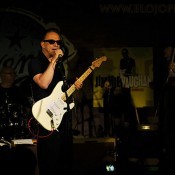 You started out as a young buck of the blues, learning from the masters. Now you are one of the real-deal old school cats. Was that a natural evolution or a freaky occurrence?
You started out as a young buck of the blues, learning from the masters. Now you are one of the real-deal old school cats. Was that a natural evolution or a freaky occurrence?
JIMMIE VAUGHAN It’s so scary that I can’t even think about it. [laughs] I’m just doing what I love, and in a lot of ways I feel like I just got here. When I was a kid I said, “I want to be a blues guitarist when I grow up.” It was a total fantasy, and I’m still trying to do that.
So you don’t feel like you’ve nailed that down yet?
You can’t ever quite be satisfied with something like that. I was always fascinated listening to guys like Albert Collins, Freddie King and B.B. King and thinking, How in the world do they know what they are going to play? I’ve been on a lifelong quest to figure that out, and all I can say to this day is that it’s all about feeling.
As a soloist, it all comes down to, “When they open that gate, what are you going to say?” After all these years, I still don’t always know the answer, and that gives me the feeling that it all could blow up anytime I’m onstage.
Come on, that’s not true.
[laughs] I’m just telling you how it feels. Every time I go out there, I get excited and my hackles go up, and I jump out and it’s fun. I still love getting myself in the right frame of mind to go play, and I still love the sense of not knowing what’s going to happen. Every night is different. You can do all the right things all day and have a scary show, or you can stumble in, doing all the wrong things, and have a great gig. There’s no guarantee. And you’re on your own up there. It’s just a great, fun thing to do.
So it still feels exciting?
Always! I play all day, every day. I just never stop playing, because that’s what I love to do. Basically, I’m living the dream, so I have nothing to complain about. Not only do I get to play music all the time but I also get to do it just the way I want. I like the niche I’ve found, and I’m just trying to play what I hear in my head, not be the most amazing guitarist in the world. For me, music is all about the space, the phrasing and how everything flows. I like stuff that feels like someone is talking to me, and that’s what I try to do—just express myself with phrasing and emotion.
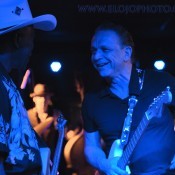 What have you learned after so many years of studying the blues greats?
What have you learned after so many years of studying the blues greats?
When it’s time to solo, they hit it hard. They come out of the chute and play something so great that they could stop after a few notes and it would be the coolest thing you’ve ever heard. And they got that from the sax players I love, like Gene Ammons. The whole Texas single-note guitar school, starting with T-Bone Walker and Gatemouth Brown, which I am part of, was inspired by sax lines and the way that amplifiers first allowed guitars to come out of the rhythm section.
The best way I can think about it is, it’s like talking; you want to hear someone tell a really good story in his own voice. You can’t figure it out like a math problem, because you have to call on your feelings. It’s really hard to talk about an approach to soloing in a way that makes sense. It’s not like I intellectualize it. I’ve talked it about more right now than I have consciously thought about it in the last three or four years. Because for me it’s very physical and emotional.
It’s been 20 years since Stevie’s death. Has your view of his musical legacy changed?
Well, no. I’m always amazed about the stories I hear from people all over the world, about the reach he had and the impact his music had on people’s lives. I’m happy and proud about that, but it’s hard for me to put his legacy in any kind of perspective.
I started playing before he did. I showed him how to play, and then he went off and did his thing, and…well, I’m still here. So I don’t think about his playing; I think about mine. He was my little brother. It’s hard to separate that fact from talking about his “legacy” or to even to separate him from me. Do you understand? You’re asking about his playing, his music, his legacy, but he’s my brother.
I know that he has a huge following and his music still impacts people. When he was here, it was incredible, but I was here too, and… [pauses]
I can hear how difficult this is to talk about. Is it easier to process and deal with after 20 years?
No, it’s not. It really and truly is not.
A lot of your music expresses a deep joy at just being alive, which I especially hear on Strange Pleasure, which you recorded four years after Stevie’s death. To me, that was a message about how to continue on after tragedy and despair, and it projects a strong message without ever saying it.
Thanks. This stuff is real emotional to me. It’s very real. A lot of people don’t get it, so I guess it’s not for everyone, but I’m glad that some people hear all that, because that means some of the emotions and thoughts I am trying to project get through.
There are only two kinds of music: the kind you like and the kind you don’t. You can do anything with music and shouldn’t think about it in terms of genres or rules. Within music, there is total liberty. No one can make you like something or play something, and no one can take it from you—not the government, nobody. That’s what makes music so great. It encompasses everything.
Are you still open to changing your guitar approach?
My guitar playing is constantly in a state of change. That’s the fun of the whole thing. Every song is an excuse for me to play lead, a blank canvas for me to paint on, and I don’t want them to be the same. I’m still learning all the time. In fact, I still take music lessons.
What do you study?
Theory, music knowledge… I work on all the basic stuff with a music teacher. I’m just constantly in a state of pushing it and exploring, because that’s what I love doing.
So you don’t subscribe to the belief that “book learning” can kill the feel?
No. I don’t think you lose anything; you just add. Just because I learn a scale or some new changes doesn’t mean I’m going to use it. But if the right situation comes up, I’ve got it in my trick bag. I still play my blues, but I enjoy all music. I really have the best job in the world, because I do what I love, and that’s what I’ve always done.
You’ve talked in the past about how hard it was to play sober after years of drinking. Does that struggle fade away after doing it for so long?
It gets easier and more comfortable all the time, but it never goes away. You just stay with it, and the older you get, the more comfortable you get and the more confident you are that you simply can do it. That excuse goes away. That’s not to say you don’t have problems anymore, but you have a different way of dealing with it, and that makes it easier.
Are you still playing stock Jimmie Vaughan Tex-Mex Strats? And what are you running through?
Yes. I’m still playing some of the first ones that they gave me. I tweak them up the way I like them, because I like to tinker, but I also play them right out of the box. I’ve also been playing a Fender Coronado with DeArmond pickups, which is a real oddball and a lot of fun.
I played Matchless for many years and still love them, but Fender has out a new Bassman reissue with a lacquered tweed finish [’59 Bassman LTD] that just sounds great right off the shelf. On the album, I used one of those and a 4×10 Matchless, and that’s it.
I really don’t use any effects, except for an occasional tremolo. I’ve always felt like the Stratocaster itself is a gadget that can give you an awfully wide range of sounds.
December 8, 2016
Gregg Allman “Come & Go Blues” Story and Video
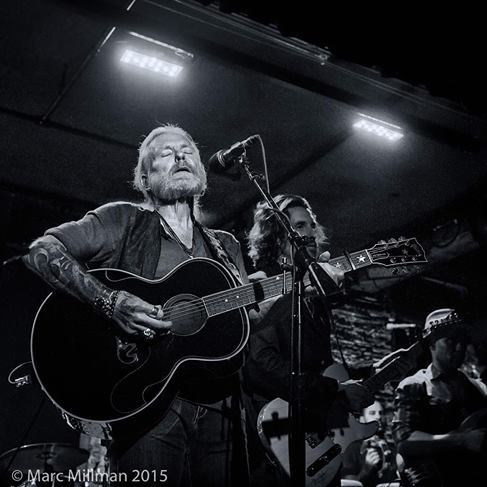
Photo – Marc Millman
In honor of Gregg Allman’s 69th birthday today, someone asked me to share a story about him that I had never told before. And so I present…
In 1997, I interviewed Gregg at 2 am in his Chicago hotel room after he played a solo gig at the Hard Rock Cafe – Jack Pearson was in the band. His wife Stacy and their two dogs were asleep behind us. It was a cover story for Guitar World Acoustic and I had brought an axe for him to demonstrate his finger-picked riff for “Come & Go Blues.” I handed it to him at the end of the interview, which had gone exceedingly well. It was the most relaxed, open conversation we ever had, by a long shot, which set the table for what came next.
He asked for a quarter and rounded off a couple of string ends. “You trying to take my eye?” he said with a laugh. Then he re-tuned the guitar, took out a pouch with fingerpicks, which he put on and showed me the riff.
Then he kept going and he played and sang all of “Come & Go Blues.” Audience of 1. It sounded just like you hear below. Happy birthday Gregg. I hope you are feeling better and healing up.
December 1, 2016
Bob Weir – Guitar World cover story
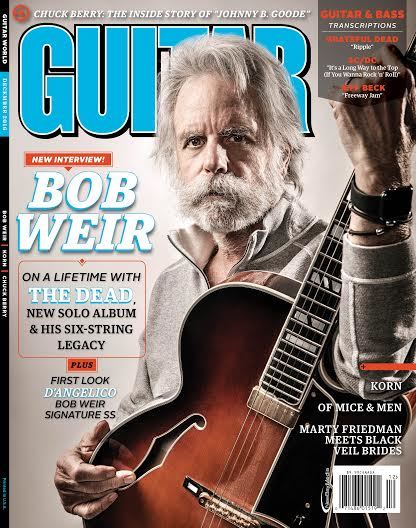
This interview was the cover story for the December 2016 Guitar World.
Bob Weir is on quite a roll. The release of Blue Mountain, his first solo album in 10 years—and his first collection of entirely new material in three decades—is the culmination of 18 very active months for the founding member of the Grateful Dead.
It started in the summer of 2015 when the Dead’s surviving Core Four—Weir, bassist Phil Lesh and drummers Bill Kreutzmann and Mickey Hart—played Fare Thee Well, five shows in California and Chicago which they said would be their final performances together.
Joined by Phish’s Trey Anastasio and keyboardists Bruce Hornsby and Jeff Chimenti, the group sold out Levi’s Stadium and Soldier Field, while thrilling legions of Deadheads around the world who watched live feeds in theaters and at home. It was the kind of triumph that was impossible to imagine when Jerry Garcia died in 1995. The Grateful Dead broke up a few months later but over the ensuing years began to regroup in various configurations.
The “final” Fare Thee Well shows were once again, predictably, not the end of the story. Soon after, Weir, Kreutzmann and Hart announced the formation of a new band, Dead & Company, joined by Chimenti and two unlikely new members: bassist Oteil Burbridge, fresh off 16 years in the Allman Brothers Band, and singer/guitarist John Mayer, best known for his pop songs and Stevie Ray Vaughan-inspired blues playing.
A new group in the shadow of the much-hyped final shows raised some critical hackles, but the fans never blinked. They understood that this was an entirely different venture. And indeed the group has reinterpreted the Dead’s vast, treasured catalog of music, with Mayer, Burbridge and Chimenti adding a more straightforward swing and youthful vitality. The band has been another big hit, selling out stadiums and amphitheaters filled with a mix of old Deadheads thrilled for another ride and a new generation of fans. Weir looks reborn with his new younger mates, singing and playing with vim and vigor.
“It’s a wonderful environment to just go for it,” says Burbridge. “It’s not about the execution. It’s about trying to find something new. The Bible says that love covers a multitude of sins and a really good jam where you go someplace you’ve never gone before will erase any mistake. That is the mindset of both the fans and the band. And Bobby is such an interesting player, who is so much fun to work with. Maybe because Jerry was playing long solos, Bobby found a really in-depth approach to rhythm playing, laying into chords all the way up and down the neck. He’s also a very underrated singer, with a pleading quality that really connects.”
Weir has always been a peculiarly underrated, sometimes even disrespected, guitar legend. Maybe it was his lack of soloing, the fact that the Dead’s soundman spent years mixing him too low or that he was always the clean cut handsome guy in a band of grizzled hippies. Probably it had more to do with three decades spent serving as a low-key sidekick to a revered guitar hero. But the mere fact that Garcia chose Weir as his foil and wanted him by his side for all those years speaks for itself.
And Garcia was never shy about discussing his appreciation for Weir, noting in 1982 that his partner was “an extraordinarily original player in a world full of people who sound like each other.
“I don’t know anyone else who plays guitar the way he does, with the kind of approach he has,” Garcia continued.
Weir’s explanation for the development of his unique style is essentially that instead of trying to copy other guitarists, he borrowed from pianists, specifically McCoy Tyner of the John Coltrane Quartet. “I just loved what he did underneath Coltrane’s work, so starting at age 17, I sat with that stuff for a long time and tried to absorb it,” he says. “I got further and further toward it. I’m very fortunate that I found a perfect role for my approach at a very young age.”
Warren Haynes, who has played often with Weir, including several tours with the Dead, says that he never stops marveling at Weir’s unorthodox approach to everything he does and the way it pushes both full band improvisation and soloists towards making more interesting choices.
“Bob’s very unique chord shapes and rhythmic patterns push you to play differently and outside of yourself,” says Haynes. “He very naturally leads you into a lot of bobbing and weaving, counterpoint, call and response. And he has this wonderful sense of not needing to compare this moment to any other moment. Every song, every performance, gets approached with a fresh outlook. It’s an intangible thing, but it’s so crucial to all he does.”
On Blue Mountain, Weir is again exploring new ground. You will hear nary a jam. Instead, the album is based around the songs, driven by his hard driving, straightforward acoustic guitar and rough-hewn voice. Like Dead and Company, the album pairs Weir with a younger generation of admirers, in this case a core of Brooklyn-based musicians orbiting around the band The National. Weir co-produced with Josh Kaufman, co-wrote much of the material with Josh Ritter and is backed by The National’s Aaron Dessner and Bryce Dessner on guitar and Scott Devendorf on bass. The Dessners’ curated the sprawling alternative tribute to the Dead Day of the Dead, which was released last spring and included three songs by The National.
Weir now sports a full head of wilding grey hair and a bushy beard. His voice has lowered and taken on some of the same gentle urgency of Garcia, with a cracking grandeur that serves the songs well. It is the song of an American icon making a stand.
GUITAR WORLD: Your collaborators on Blue Mountain feel like a left turn. How did you hook up with these guys?
WEIR: Four or five years ago we did a web broadcast from my studio (TRI) celebrating Jerry’s 70th birthday and we assembled a crew of young bucks to focus on Jerry’s songs and the Devendorfs and their Brooklyn crew showed up in spades and we got along real well. I was impressed by how hard they listened and how economical they were in what they offered. A couple of years later they called, said that they had been talking amongst themselves and come up with the notion of doing a record of cowboy tunes with me. And that seemed like a great idea, like something right up my alley.
Why?
Cowboy songs have always had an allure to me. I spent time as a kid, a young teen, in a bunkhouse kind of living that life. I’d spend my evenings with these old guys who had grown up in an era before radio had reached the nether regions of Wyoming and their notion of what to do for an evening was to tell stories and sing songs. I was the kid with a guitar so I became the accompanist and I learned a bunch of the tunes and the delivery and the esthetic – the ethos if you will.
And is that where you learned country songs you brought to the Dead, like Marty Robbins’ “El Paso” and Merle Haggard’s “Mama Tried.”
Yes, more or less. I heard that stuff and developed an affinity for it and an understanding about how to approach it. Not necessarily those exact songs, but I could hear where they were coming from and understand their value.
You sing these songs like they are from the bottom of your heart. How hard to develop that level of sync with a songwriter like Josh Ritter whom you had not known before?
He’s a gifted songwriter and there was actually a lot of back and forth. There weren’t all that many tunes that he offered that we did straight the same way. He’d come up with a line and I’d say, “Now how about this?” One thing tripped something else in my thinking and so forth. We went back and forth and I definitely had a feeling of collaboration on the songs – and that’s always been my preferred way of collaborating with guys like [John Perry] Barlow and [Robert] Hunter.
This album is so different than the Grateful Dead. That’s how you approached solo projects throughout the Dead’s prime – for instance, “Heaven Help The Fool” and Bobby and the Midnites. Ratdog became very Dead-like, so in a way this is more of a throwback.
Well, yeah! That’s really what I like do to because otherwise it’s not a vacation. If I’m going to use the same approaches and methods then I might as well do it with the guys I’m used to doing it with because we have that worked out. No one’s going to do it better with me. If I’m going to go exploring, then all bets are off and let’s just see what we turn up.
So is the goal finding a balance between Dead Bob and solo Bob?
[laughs] Yes! That’s what I’m always working toward.
“Ki-Yi Bossie” is one you wrote with your guitar tech AJ Santella and it’s a very interesting tune, addressing a 12-step program in the context of a real cowboy song. Did you set out looking to write a song about the program?
It’s rarely that direct! I don’t know how I found myself there. I had a notion for what the song was going to be about, that it would end with a guy who’s punching cows, which is his refuge from another existence. So I wanted to go to another existence first and I thought I better start out real bleak – and that took me to a basement room and a 12-step program.
I took the 12-step to be literal and the cow punching to be a metaphor for chord punching – being saved by music.
Well, yeah. That’s it. The guy could have ended up in a monastery but then he wouldn’t have ended up on a cowboy record. I should make mention that Lukas Nelson kicked me along while I was developing the song and he had a lot to do with the setting– the rhythm , the key, the tonalities. This totally slipped my mind when I was doing the credits!
Will Dead and Company work up and play any of these songs?
I’m not sure that they work in that context. The bulk of them don’t lend themselves to what Dead and Company do. I’m hugely looking forward to playing these songs live with this band on tour this fall. They’re all good players and the places we’re playing are fun places that we’ve carefully chosen. We’re gonna have some fun on this tour.
I assume that what it’s all about for you at this stage of your career. Would you do anything that didn’t seem like it would be fun?
No. [laughs] I can happily say that I’ve come to the point in my life where the stuff that I do is the stuff that what I want to do.
Did you enjoy the summer Dead and Company tour as much as you seemed to on stage? The whole vibe was as positive and upbeat as anything I recall in Dead world for a long time.
Yeah. It’s been great all around and we’re starting to navigate uncharted waters, which was the whole idea of the endeavor from the beginning. We’re just now getting there, but the band was spitting fire all summer.
Could you elaborate on what you mean by “uncharted waters”? It’s a tricky line to walk there, playing the classic material while having your own identity.
Yeah. We’re trying to be ourselves and be unique. The material itself is “classic” now, but it’s drawn from all our sources – all the stuff that we listened to and grew up on. We extrapolated that all out into the music of the Grateful Dead, but we never stopped listening to stuff and never stopped having new thoughts about where to take the material and how to interpret it. So even within the Grateful Dead, the music was never, ever static.
Now we have an ensemble with three original -or virtually original – members of the Grateful Dead, one guy who’s played with us for years (Jeff Chimenti) and two guys who are virtually new to the material. They have their own set of roots and influences and ideas and we need to observe that in the band and then work with it. They’re not supposed to just be mimicking parts.
Do the original guys change what you’re doing in response to the new musicians or do you think, “Hey, I’m Bob Weir. They have to fit around me”?
Well, obviously it’s both. I have to change because of what they’re doing. if they’re going to shade a tonality this way or that, I have to go with that to one degree or another. I have to listen to that and sort out for myself if that’s where I want to go. I’m the guy who knows where the song is coming from better than they might, so it’s up to me to ask, “Is this where the song wants to go?” Do I try to shade the tonality or rhythm back towards the original or do I try to go with and even build a fire this new direction? That can be really exciting, too. Sometimes it’s a rather arbitrary decision on my part, and there’s a bit of adventure in that.
We’re getting to the point where we know each other well enough to where we can anticipate where one another is coming from – and from that we can intuit where each is heading. So new stuff is going to come out of the old material and then you’re not quoting chapter and verse from the Grateful Dead. You’re extrapolating and making it up as you go. That’s when it’s time to put the hammer down and start writing because there are new things to say.
So you anticipate writing new material with and for the band?
Oh yeah! And I very much look forward to it.
Any chance of a new recording?
It’s not active right now, but I would think so, yeah.
How does the nature of improvising with Mayer differ from Jerry? He seems to really dig into chords and rhythm and engage with you there more, which alters the feel.
Jerry did that often enough as well. I actually think when John does that he’s often doing his best to quote Jerry. If he’s going to start playing chordal stuff, I’ll either play against him or go to single line stuff. I’m all about trading back and forth and always have been. That’s been conceptually the same going back to the beginning, throughout the Grateful Dead and in all post-Jerry bands even when the actual approach changes, as it always does.
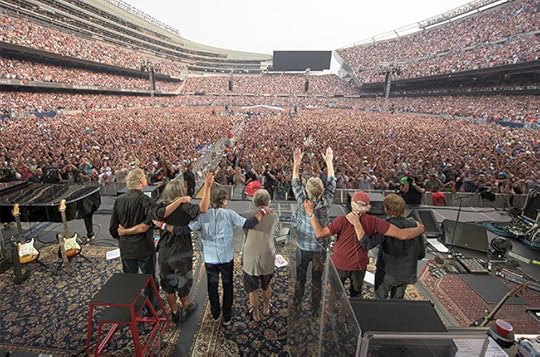
Photo – Jay Blakesberg
Can you compare the musical and emotional impacts of Fare The Well and Dead & Company?
Dead and Company is much more of a band. We are a much more cohesive unit that the Fare Thee Well outfit had an opportunity to be. On account of people’s scheduling and things it was very difficult to get much rehearsal in – and we only did five shows!
Dead and Company put in a lot more rehearsal and then hit the road. And the only way you get a real band is by playing together in front of people. There’s no shortcut. There’s no other way to do it – at least the kind of band we are trying to build. The Fare Thee Well outfit just simply didn’t have that opportunity, which Dead and Company has had. And I think we’ve kicked the ball down the field a fair way.
Were you surprised by how quickly and thoroughly Deadheads embraced John Mayer, who seemed like an unlikely fit on the surface?
No! Not at all. The night we met was at a TV show that he was hosting and I was invited to play with him. We ascertained very quickly that it was going to be a lot of fun. I sorted out real fast that he was up for the job. I really just pretty much knew from that time I met him that it was going to work so I’m not surprised that other people have found that to be the case. He’s a fabulous player and he’s coming from a place of love. He loves the music, and he loves the way we go about making it. So what more is there?
Phil’s unorthodox bass playing had a lot do with the Grateful Dead’s sound. You guys have given Oteil the freedom to not mimic that. How would you describe the difference between their approaches?
[long pause] Oteil is a much more traditional bass player albeit he’s very, very fluent on his instrument. A fantastic player. Phil is an iconoclast by nature and to some degree I think he actually disdains the traditional role of the bass player. I kind of always wondered what the music would sound like with a guy who would lay into the 1 and 3 a little more often than Phil is inclined to do and it’s gratifying to hear that.
You recently said that you hope John is carrying the torch by playing these songs decades from now. That shows a lot of faith.
Over the course of our first tour, I became aware and then convinced that he gets what we are up to and is up to the task of carrying the torch.
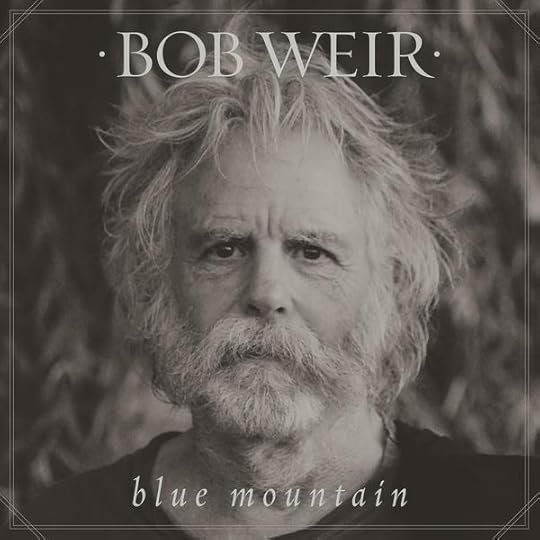 It also shows that you’re taking a long view.
It also shows that you’re taking a long view.
Look, there’s gonna come a time when I’m not going to be able to be out there playing and when Bill and Mickey aren’t going to be able to do that on account of our unfortunate demises. That’s just how it is and I’d love to see this tradition carried on into the future, well beyond us.
I think some great things can come of it and it doesn’t necessarily require my participation. Right now, there are a lot of good Dead cover bands and others out there playing the music and doing it justice. That’s very gratifying and in the future I hope there are going to be remarkable people using our approach and some of our material as vehicles to create wonderful new music. I want to see that happen and I’m very happy for John to be a part of it.
All of your guys’ bands together and separately have become like a Grateful Dead University, with younger musicians like John, Oteil, Jeff Chimenti, Joe Russo, Warren Haynes and Trey Anastasio, learning directly from the originators.
It looks like that’s what’s coming together and it’s great. There are going to be future professors in that school of music who will amaze people. I’m just happy to see that happening, to see that approach starting to be more formalized to some degree by people who know it, understand what it’s about and know how to approach it and do it justice.
There have been a lot of books written about the Grateful Dead. Do you ever read them?
No, I’m dyslexic in the extreme. I read a lot but I don’t get all that much read. I’m writing a book myself and I don’t want to be influenced by anything anyone else has ever said. The exception is Dennis McNally’s book [A Long Strange Trip: The Inside History of the Grateful Dead] because it is sort of definitive history – he was our historian – and I’m tracing through it to remind myself of the chronology of events so I can paste my recollections and observations around it.
How did you end up playing with Paul McCartney at Fenway Park?
I’ve wanted to play with him since I first heard the Beatles! We listened to a lot of the same stuff growing up; a lot of his heroes are my heroes. The Beatles could play a Bakersfield shuffle better than anyone in Nashville these days can. They knew intimately what Buck Owens and Little Richard were up to; they knew American music quite well. They played real rock and roll – not “rock music.” There was a roll to it, too. I’m not sure that they got there from some studious application or academic pursuit. They osmosed it the same way we did. So we speak a lot of the same language.
I’ve wanted to play with Paul for the longest time and it so happened we finally ended up in the same place. It was big fun and I hope to have a soundcheck the next time we do it!
November 30, 2016
Doyle Bramhall II on his new album
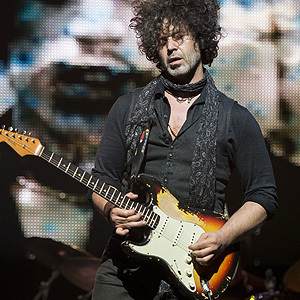 Doyle Bramhall II on his recent album, Rich Man. Originally published in Guitar World.
Doyle Bramhall II on his recent album, Rich Man. Originally published in Guitar World.
“This feels monumental to me,” says Doyle Bramhall II, about Rich Man, his first album since 2002’s Smokestack. “I spent a year and half recording it and 16 years gathering inspiration and influences.”
Since his last release, Bramhall has worked on stage or in the studio with the Tedeschi Trucks Band, Sheryl Crow, Roger Waters, Gary Clark Jr., Gregg Allman, Questlove, and B.B. King, as well as Eric Clapton, whose band he has anchored since 2000. The wide range is reflected on Rich Man, which finds him standing at the crossroads of blues and rock that he has explored throughout his career, on his own and with The Arc Angels, while also adding large doses of r&b and traces of various world musics.
“I’m like a musical hunter gatherer,” says Bramhall. “Every experience I have, every artist I work with, becomes a fragment of my journey. I’m always learning craftsmanship and artistry and striving to find an ever deeper, higher connection to music. That’s why I listen to a lot of classical, jazz, Arabic, Indian, Moroccan and Sufi music – the highest forms of pure music without any idea of a marketplace.”
Rich Man ends with a cover of Jimi Hendrix’s “Hear My Train A Coming,” which Bramhall, whose father Doyle was Stevie Ray Vaughan’s lifelong friend, musical inspiration and songwriting partner, says he never intended to use. “We just played that live in the studio, and when I sequenced the songs, I felt that they told a complete story and ‘Hear My Train’ brought it full circle, to the beginning of things – the blues.”
Throughout the album, Bramhall tried to bring to his own work the same looseness he helps others achieve as a producer. He notes that it’s often easier to let go when working with others, where he finds his ideas flowing freely.
“On my own music, I tend to get more caught up in trying to make a song exactly how I envisioned it when I wrote it,” he says. “With this album I was able to let go and allow the music to find itself.”
November 17, 2016
Warren Haynes, Don Was to take the Last Waltz 40 on the road
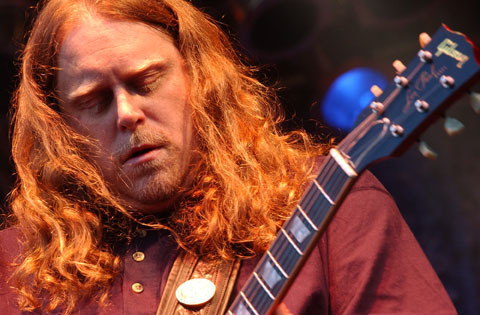 I was in New Orleans during Jazz Fest when Warren Haynes and bassist Don Was hosted an all-star tribute in honor of The Last Waltz’s 40th anniversary. It was a great night at the Saenger Theater. Now, in honor of the album’s 40th, the same all-star collection of musicians will take this tribute on the road.
I was in New Orleans during Jazz Fest when Warren Haynes and bassist Don Was hosted an all-star tribute in honor of The Last Waltz’s 40th anniversary. It was a great night at the Saenger Theater. Now, in honor of the album’s 40th, the same all-star collection of musicians will take this tribute on the road.
Haynes and Was will be joined by the same group that played in New orleans: John Medeski, Jamey Johnson, Terence Higgins, Michael McDonald, with original horn charts composed by Allen Toussaint will also be used. Expect special guests to be announced because… Warren. I hope Bob Margolin is added, because he kind of stole the show I was at.
“The Last Waltz is one of the greatest rock music moments in history,” Haynes tells Rolling Stone. “When we did it in New Orleans, it was so much fun. We were able to honor what came before and still come up with a different take on the original with a very unique blend of musical personalities.” The show originally took place on November 25th, 1976 in San Francisco, and has come to be recognized as one of the greatest performances of all time. Musicians like Eric Clapton, Bob Dylan, Dr. John, Van Morrison, Ringo Starr and more joined up with The Band for their final performance.
The Last Waltz 40 Tour Dates
January 21 – Hollywood, FL @ Hard Rock Casino
January 23 – Clearwater, FL @ Ruth Eckerd Hall
January 24 – Atlanta, GA @ Woodruff Arts Center
January 25 – Nashville, TN @ Ryman Auditorium
January 27 – Red Bank, NJ @ Count Basie Theatre (Jamey Johnson not scheduled to appear)
January 28 – Boston, MA @ Orpheum Theatre (Jamey Johnson not scheduled to appear)
January 29 – Philadelphia, PA @ Verizon Hall/Kimmel Center
January 31 – Toronto Canada @ Sony Centre
February 2 – Albany, NY @ Palace Theatre
February 3 – Westbury, NY @ Theatre at Westbury
February 4 – Washington DC @ The Theater at MGM National Harbor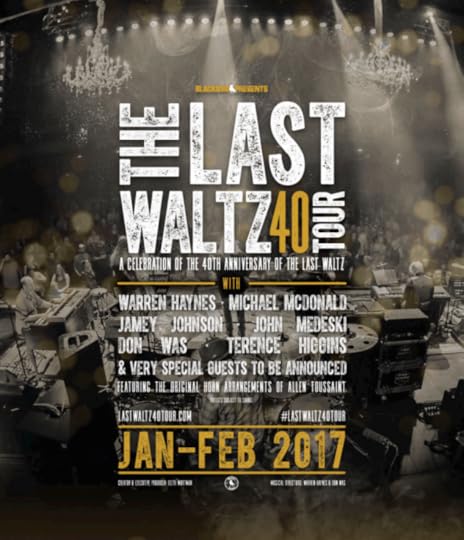
November 15, 2016
The downside of being an expat: Saying Good Bye
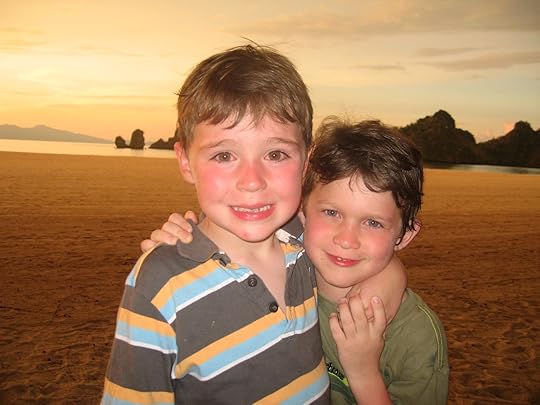
Eli and Hugo on the beach in Malaysia. Ah, expat life.
Going through some old files looking for something and I came across this 2007 The Expat Life column about the sadness that descends every June as dear friends move on. Just thought I’d share.
**
Summer is the transient time of the year in our notoriously transient expat community. As soon as school is out, people are on the move. Within days of school letting out last June, friends had begun departing for Shanghai, Singapore, San Francisco, Sydney, Cleveland and Helsinki. These people are both returning home and moving on to their next assignment, in approximately equal numbers.
People who have lived this lifestyle for a long time manage to shrug it off, attending one bon voyage party after another then moving on. Last year as expat newbies we were a bit staggered by the process, which was already easier in this, just our second year. The volume of movement is quite disconcerting, but what else can you do but bid your friends best wishes and keep moving?
It’s not always so simple for the children. Last year our eldest son Jacob lost his first two best friends in Beijing. He was thrown for a major loop by this, but adjusted pretty easily and has stayed in touch with both buddies. We visited Javier Wong in San Francisco over Christmas break and saw Andrew Moy in Washington DC in August. Both times, the boys reconnected like they’d seen each other the day before.
This year it’s Jacob’s little brother Eli who suffered a big loss, as his dear friend Hugo’s family moved to Singapore. Eli has suffered more than any of us from leaving friends and family behind in the U.S. and I feared the worst when I learned about Hugo’s impending move.
I thought back to when we first met Hugo’s family, on vacation in Thailand. Playing on the beach, Hugo asked my boys if they could be friends forever.
“Sorry, no.” Jacob replied, acting as the spokesman. “We actually live in New Jersey and we’re just in China for three years.”
“Oh,” Hugo replied. “Can we be friends for three years then?”
“Sure.”
Hugo smiled; three years is forever to a five-year-old.
The whole conversation struck a chord with me, revealing something about our current existence, beginning with the fact that it took place in Phuket, a place I never really thought I’d visit. Eighteen months later, Hugo became another long distance friend, moving on to another place of which I was only dimly aware just two years ago. It was further evidence of how much worldlier my kids are than me.
Eli took the news surprisingly well – partly because it was tenderly delivered by Hugo’s father, rather than me — but it only reinforced his generally pessimistic assessment of expat living, which he views as an endless series of heartbreak. I often try to explain to him how his life is only richer for this experience.
“Everyone in America is still there and we still love them and they still love us,” I tell him. “And now you also have all these great new friends. After we go back to America, we’ll have friends in Australia, Hong Kong, China, England…”
I’m telling him a kids’ version of “It’s better to have loved and lost than never to have loved” and he doesn’t buy it any more than anyone else hearing this bromide while nursing a broken heart. When I tried this approach yet again in the wake of Hugo’s departure, Eli performed an interesting bit of rhetorical judo on me.
“Now we’re stuck,” he said.
“What do you mean?”
“We know we’re not going to always live in the same place as the Ohlssons (Hugo’s family) or the Camerons (his best friend Race’s family). That means we will always miss them and be sad.”
“But we’ll have new friends all over the world, and we’ll still be able to see a lot of them at special times.”
Eli was having none of it.
“We were fine before,” he insisted. “Now we’re stuck.”
These conversations make me pause and worry a bit about my sensitive son, but they haven’t shaken my belief that this experience will be long-term positive for the kids. Hopefully, as Jacob and Eli lose soul mates year after year, they appreciate their ability maintain those relationships, even while forming new ones. In any case, August and September are a time for optimism; the moving trucks filling our compound lanes these days are bringing people in, not out.
November 10, 2016
We’re not moving to Canada. So what do we do now?
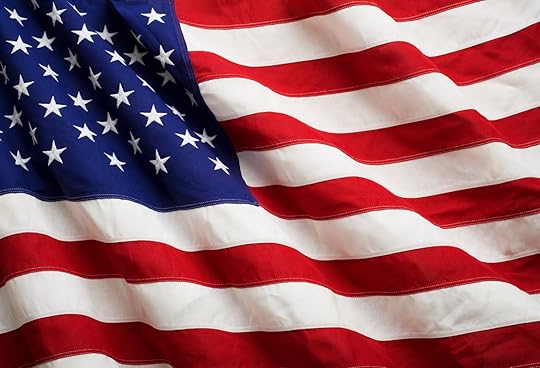 Stop talking about moving to Canada! It’s not happening and it’s insulting to the people who really are most likely to be in trouble and simply don’t have the option. Our African American brothers and sisters survived slavery, Jim Crow, redlining and a million other indignities. Other generations have lived through Depressions and World Wars. This is our nation! You can’t just throw up your hands and leave when things get dark.
Stop talking about moving to Canada! It’s not happening and it’s insulting to the people who really are most likely to be in trouble and simply don’t have the option. Our African American brothers and sisters survived slavery, Jim Crow, redlining and a million other indignities. Other generations have lived through Depressions and World Wars. This is our nation! You can’t just throw up your hands and leave when things get dark.
But you also can’t just go back to your life and tweeting and posting about Game of Thrones or the Steelers. We were too complacent and THAT’S A BIG PART OF THE REASON WE ARE WHERE WE ARE. We have to accept this responsibility and re-assess.
As conservative anti-Trump pundit David Frum just wrote, “The lovely American confidence that ‘everything will be all right’ has itself now become a serious danger to everything being all right.”
Day one led to these incidents experienced by regular people and shared on Twitter: https://twitter.com/i/moments/796417517157830656
If they don’t freeze you in your tracks, I don’t know what will.
We have to move forward with an understanding of just how not all right things can get and stay calm but firm. So where do we go from here?
•Be vigilant, be vocal, be organized. Be involved in local politics. Get off our asses. Do good in your own community. Volunteer at a school. Walk patients into abortion clinics. Register voters. Go to school board meetings. Run for School Board. Run for town council. Just get your head out of your ass, off of Facebook and Twitter and DO SOMETHING. We have to be honest; Social Media is part of the problem in so many different ways.
Cancel Netflix and donate the money to one of the groups listed below. Act like this really matters and you really are scared – AND ANGRY. And humbled. We need to be humbled. There was a very real, very frightening White Nationalist core to Trump’s support, but it is arrogant and wrong to think that’s all it was. We had our eyes and minds closed to too much.
•There is not-insignificant chance of very real damage being done to our institutions and core values. We need to be vigilant and we need to support one another – and most importantly, the most vulnerable people in our midst. I will be re-upping and increasing my support of the ACLU and suggest you do the same.
•As noted earlier, there are already reports of emboldened white nationalists harassing people, spray painting swastikas and other racist and anti-Semitic things and other forms of thuggery and racial intimidation. Be alert, stay safe, protect one another and keep fighting. There is no organization better prepared to monitor and battle this than the SPLC – Southern Poverty Law Center. Support them. I have been a member for years and will be increasing.
•Nobody is going to be on the frontline more than Muslims. The Council on American Islamic Relations (CAIR) is a great organization. If you don’t stand with them, you stand against them. There is talk of Muslims having to register. If that happens, this is Berlin 1930. Pick a side.
•I believe that voter suppression played a role in the final results, particularly in Wisconsin and North Carolina. Help it end! Vote Riders, Project Vote, the Brennan Center and the NAACP Legal Defense Fund all do great work in this area.
•Refugees need our help more than ever. Most of us have ancestors who were refugees not long ago. The International Rescue Committee is top-notch.
•Stop blaming the “media.” The New York Times, the Wall Street Journal and Washington Post all did excellent jobs reporting on Trump. People KNEW WHO HE WAS when they voted for him. They either liked it or voted for him anyway for other reasons.
Cable TV news is a whole other issue. CNN in particular certainly gave Trump a giant boost early with their excessive coverage. You’ll feel a lot better if you don’t watch it much.
•Subscribe to a real newspaper or news source. The fake news crap popping up here on Facebook is a serious menace. It costs money to pay reporters to do real investigative journalism. The internet has taught everyone this should be free. Never more important than now to have real reporting going on. Pay for a news source today!
•Aaron Sorkin wrote a letter to his daughter that you probably should read. http://www.vanityfair.com/…/aaron-sorkin-donald-trump-presi…
Robby Krieger on “When The Music’s Over”
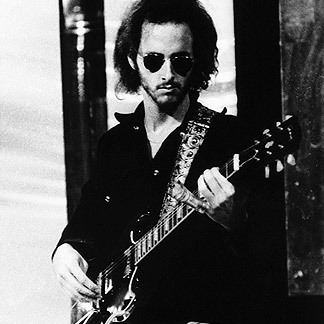
I heard The Doors’ “When the Music’s Over” on SiriusXM’s Deep Tracks today and was struck both by how appropriate it felt and how good it was. Then I remembered how much I enjoyed talking to Robby Krieger about his killer guitar solo, which features two harmonized tracks, and I dug it up. Enjoy:
“That solo was really a challenge because the harmony is static. I had to play 56 bars over the same riff, which isn’t easy. It’s a lot easier to play something over an interesting chord progression. But we did that a lot because we were really into [saxophonist] John Coltrane, who pioneered “modal” jazz and soloed brilliantly over static harmonies and minimal chord progressions. I was always trying to play something that sounded like him—just totally out there in terms of tonality. I think “When the Music’s Over” is the closest I ever came.”
November 8, 2016
Gregg Allman cancels City Winery shows – his band will play on

Photo – Derek McCabe
As first reported by Adam Zagoria on Zag’s Blog… sad news.
PRESS RELEASE FROM CITY WINERY:
It is with sincere regret that we announce that Gregg Allman will be unable to play the remaining shows he has scheduled for the rest of 2016 and beginning of 2017.
The City Winery residency will be rescheduled for July 2017.
Allman says, “This is the hardest thing I’ve had to do in a long, long, time. I’ve been on the road for 45 years because I live to play music with my friends for my fans. As much as I hate it, it’s time for me to take some real time off to heal.”
Allman plans to take several months off to focus on his health so he can return to playing live later in 2017.
“Not making a show is a really hard decision for me because I want to play so bad, but it’s also hard on my partners and fans who make plans to be with me. I never want to put anybody in a bad spot. I’m so grateful for the people that I work with and for the fans that come to my shows and I want to be at my best for all of them. That means I’m going to have to wait until I’m feeling really good, not just good enough like I have been. Good enough isn’t working for us all.”
His band will play on with special guests, for at least the next two shows, which sound pretty cool.
THE GREGG ALLMAN BAND WITH SPECIAL GUESTS
11.9 – The Allman Brothers Band – First Studio Album (and more hits)
11.10 – Gregg Allman – Best of The Solo Years
November 3, 2016
Stream track from new Rossington album
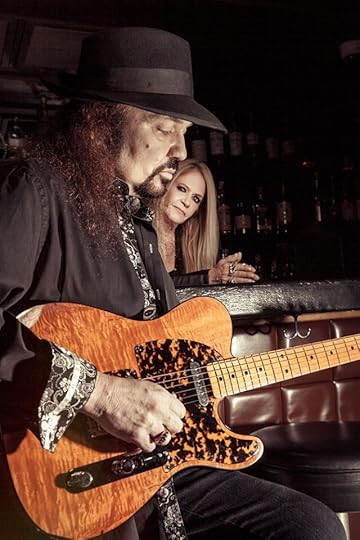
Photo – Travis Shinn. This Tele belonged to Prince!
Gary Rossington and his wife, Skynyrd backing vocalist Dale Krantz-Rossington, have a new album Take It On Faith, out tomorrow. Dale was the lead vocalist in the Rossington Collins Band and returns to that role here. I interviewed Gary about it for Guitar World. Story will be in the next issue. In the meantime, enjoy a preview of one tune I liked, “Highway of Love.”
Take It On Faith was produced by David Z (Prince, Buddy Guy, Etta James), and musicians on it include the late Richie Hayward (of Little Feat fame), Delbert McClinton, Bekka Bramlett and Double Trouble/Joe Bonamassa keyboardist Reese Wynans.
One thing I learned in the interview; the Telecaster in the picture on this page belonged to Prince. “Our road manager bought it and I just grabbed it for the photo shoot,” Gary told me. “It was right after Prince died and I thought it was cool to have his guitar, which he apparently played a lot.”
If you’re a Skynyrd fan, you’d likely enjoy this story about the making of “Free Bird.”
“Highway of Love”



